- She’s not old enough.
- She’s too old.
- She’s actually a he.
- The days are too short.
- The weather is too extreme.
- Something is stealing the eggs.
- She’s hiding the eggs.
- She’s eating the eggs.
- She’s randomly laying the eggs wherever, rather than in a nest.
- She isn’t getting the nutrition she needs.
- She’s molting.
- She’s broody.
- She’s sick.
- She’s stressed.
- She’s obese.
- Troubleshooting Tips
Ducks lay eggs. Except when they don’t.
Why aren’t my ducks laying? Why did my ducks suddenly stop laying? When will my ducks lay? Shouldn’t my ducks be laying more eggs than this? It’s one of the most frustrating issues people have with their ducks, and also one of the most frequent complaints I hear.
The definitive answer is here. Every “my ducks aren’t laying eggs!” case I’ve ever heard of can be attributed to one or more of these fifteen causes:
Disclosure: This post contains affiliate links. As an Amazon Associate, I earn a commission if you purchase something through a link on this post, at no additional cost to you.
Let’s go into a bit more detail.
She’s not old enough.
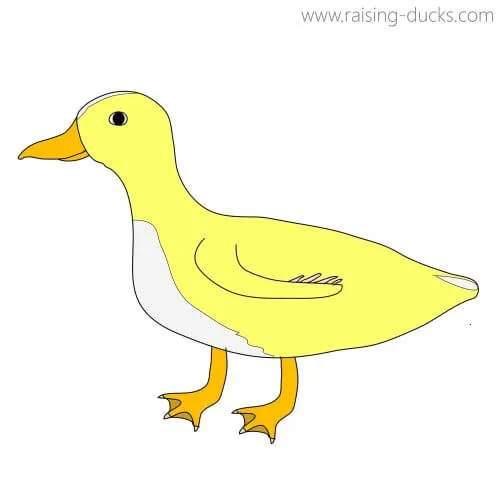
Ducks normally start laying around five to six months of age. Some people expect them to mature earlier. Also, just seeing your ducks mating doesn’t mean they’re ready to produce eggs, because drakes are able to mate before female ducks are ready to lay. Read “When do ducks start laying eggs?” for more.
She’s too old.
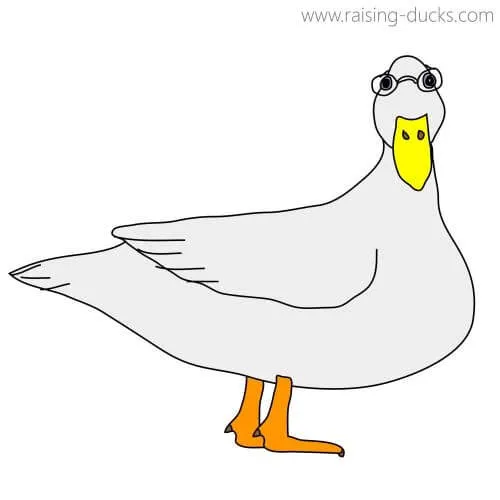
If you bought adult ducks from someone else who didn’t mention their age, it’s possible they’re too old to lay. Or if your ducks have been laying less and less as the years pass, it’s because they’re getting older. Ducks lay the most during their first year, and gradually slow as they age. By four or five, they probably won’t be very productive. By seven, they may have completely stopped. Keep in mind that it varies a lot and these are just averages. I currently have six-year-olds that still seem to lay quite well, and some people have ten-year-olds that still lay. Read “When do ducks stop laying eggs?” for more on when ducks stop laying.
Keep in mind that your duck hatches with all the eggs she will ever lay already inside her. This means that technically, you can’t make your ducks lay more (through artificial lighting and other techniques). You can only make them empty their supply faster. If you’ve been pushing your ducks to lay as fast as they can, they will run out of eggs sooner. This also mean that ducks such as Khaki Campbells will stop laying sooner than something like an Aylesbury. You can’t expect your duck to lay steadily for 5+ years if it’s a Khaki Campbell that has been eating a high-protein diet and been living in artificially extended days. She might have to call it quits by three.
She’s actually a he.
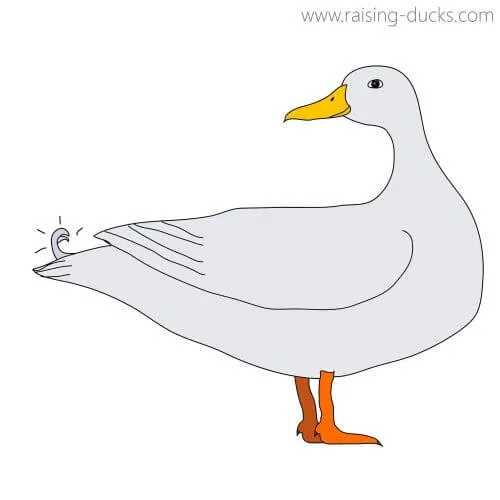
Are you absolutely sure your ducks are females? Sellers aren’t necessarily trustworthy. Last year, I bought four geese from a lady who claimed the all-gray geese were females and the saddleback (part gray, part white) ones were males. There are a few breeds of geese that you can sex by color, but I was suspicious because I didn’t think ours were one of those breeds. Sure enough, one of the saddleback geese started laying not long after we got her, and both of the gray geese were ganders.
Read “How to Sex Ducks and Ducklings: What Works and What Doesn’t” if you’re not sure how to tell whether your ducks are males or females. If you have Muscovies, read this article: 10 Effective Ways to Sex Your Muscovy Duck.
By the way, have you ever actually witnessed a duck laying an egg? Here’s a closeup video of my two adorable Muscovy duck sisters, Peaches and Mitzi, laying their eggs:
The days are too short.
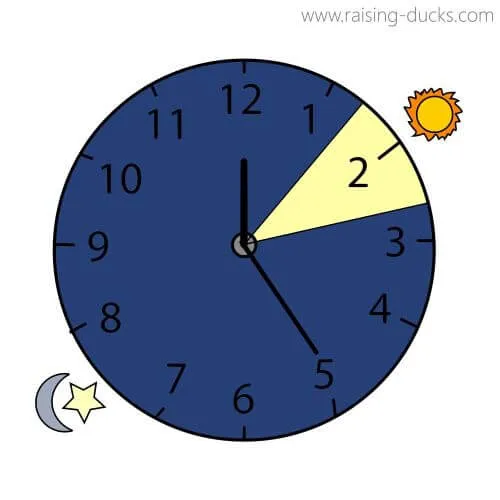
I think this is the most common answer to the complaint, “My ducks aren’t laying!” There are very few breeds of ducks that will lay all year round, and even those don’t necessarily lay if there isn’t enough light. Ideally, ducks need 14 to 16 hours of light per day in order to lay at their maximum potential. Many flock raisers get around this problem by giving their ducks artificial light to lengthen their “day.” Here’s information on giving artificial light to your ducks to boost their laying: How to Use Lights to Increase Duck Egg Production.
In some locations where days get very short, ducks only start laying during their first spring after they’re old enough. For example, if they hatched in March, they’d be old enough to lay around September, but by that time the days would be too short, so they would only start the next spring, most likely only after all the snow has melted. Even more extreme, but not impossible, would be a duck that hatched in January, is mature enough to lay in June, but doesn’t start laying until next April—when she is sixteen months old!
Some breeds of ducks are seasonal layers and only lay in spring no matter how long the days are. Many meat breeds and other breeds not bred for extreme egg production are like this. Mallards, for example, will likely only lay two or three clutches a year, all in spring.
Even if the days should be long enough, are your ducks kept in a dark barn or coop? If their living area is too dark, they won’t know when the sun comes up, and thus the day will seem shorter and they may not lay.
The weather is too extreme.

Temperature extremes will prevent a duck from laying. If you live in an extremely hot climate or if your ducks don’t have adequate shade or constantly-available cool water, they may not lay much. Cold also influences their laying. Muscovies are especially sensitive to cold and it can be difficult to get them to lay if there’s snow on the ground.
Even just ordinary weather changes can temporarily mess up laying cycles. I’ve noticed that our ducks lay less if we’re having a cloudy or rainy spell, although that could just be because the sun is covered in clouds and thus it seems like it takes longer to rise.
Something is stealing the eggs.

Here’s another major cause. Our German Shepherd puppy, Nora, quickly became an egg thief once she started discovering nests, although we were able to nip the habit in the bud. Foxes have also stolen many, many of our eggs.
If your ducks free range (like ours), this is a likely reason. To prevent foxes or other animals from stealing the eggs, keep your ducks locked up in a coop until they have laid their eggs. What time they lay varies a lot, but most ducks will be finished laying by 8 AM. Read “What time do ducks lay their eggs?” for more. If you go to work before this time, you might consider investing in an automatic coop door.
Unfortunately, some ducks are so desperate to lay in whatever hidden nest they deem superior to what they have in their coop that they will hold their eggs until they are let out, even if it’s past noon, so keeping them in the coop isn’t necessarily foolproof.
Even if they are in a coop all morning and/or spend the day in an enclosed run, be sure that there are no gaps that an animal could slip through. Even small animals such as mice, rats, and snakes can be thieves. You may need to predator-proof your coop.
She’s hiding the eggs.

Your duck herself is an even more likely culprit than a wily fox. She may be laying, just not where you expect! It’s hard to convince some ducks that your nest is the best place to lay. My ducks have laid eggs in wheelbarrows that were covered and I thought could not be entered, clumps of thick grass (saw grass, at that!), bushes on the neighbor’s property, under tarps, and pretty much any hidden, dark area they could find. One of mine even thought about laying inside an empty cement mixer. Here’s an article I wrote on defeating those sneaky ladies who hide their eggs—although I can tell you from personal experience that it’s pretty much impossible to completely prevent them from hiding eggs without taking away their free ranging privileges or at least keeping them locked up in a coop or run until noon.
She’s eating the eggs.
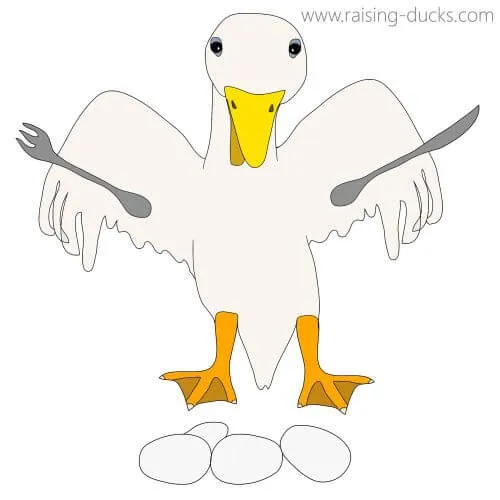
Ducks don’t normally eat their eggs. However, once upon a time, a duck might accidentally break one of her eggs. Then she tastes it and…yum! And it becomes a habit to break and eat all her eggs, and maybe also the eggs of other ducks. Here are two articles on Backyard Chickens about breaking an egg-eater. They are about chickens, but they apply to ducks as well.
She’s randomly laying the eggs wherever, rather than in a nest.

Don’t assume that eggs will only pop up inside a nest box. Some ducks have zilch interest in nests, especially the ones that are the most prolific egg-layers, such as Runners and Khaki Campbells. They will drop their egg wherever they happen to be when they feel the egg coming. If they have a pond, they might be dropping the eggs in their pond. If they free range, the eggs could be anywhere in the grass. To be sure you are able to collect her eggs, make sure she stays locked up in a coop or small run until it’s late enough in the day that she should have laid her egg.
Here you can see an example of my Saxony and Khaki Campbell ducks’ indiscriminate laying, compared to my Muscovy ducks, who always hide their nests:
She isn’t getting the nutrition she needs.
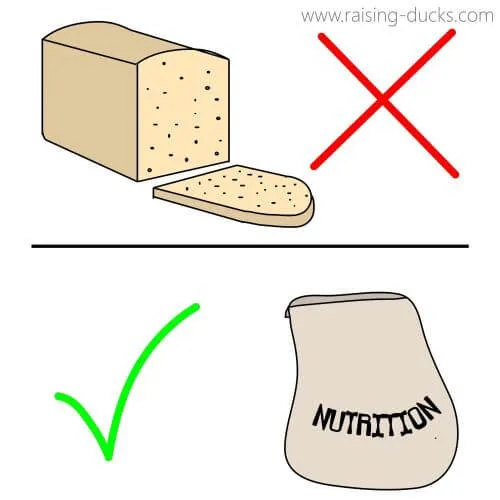
A duck that relies on the food it gets from free ranging, or one that only receives “treat” foods such as lettuce and watermelon is not getting enough nutrition—especially protein—to regularly lay. Also, feeding plain corn, scratch, or any commercial feed with inadequate protein will cause problems. A laying duck’s diet needs to contain approximately 17% protein.
Of course free ranging is natural, and ducks in the wild don’t have any trouble laying. The problem is, they won’t lay nearly the amount of eggs we might expect, because today’s perfectly computed feeds have been crafted to squeeze out every egg the duck is capable of laying. In the wild, they only need a few clutches. If you want your ducks to find all their food free ranging, that’s great, but you simply cannot expect 300 eggs a year, because that’s an unnatural amount and can only be achieved through unnatural feeding.
Lack of calcium is another nutritional problem that can completely stop a duck from laying. Most flock raisers offer their birds free choice oyster shell or crushed eggshells to be sure they have adequate calcium.
She’s molting.

Ducks normally molt (replacing all their old feathers with new ones) twice a year, and they can’t lay and molt at the same time, because both eggs and feathers contain high levels of protein, and it’s too difficult to produce both at once. However, problems arise when a duck is taking too long to molt or is molting too often. Ducks in regions with long periods of short winter days may take up to six months to molt. A diet with low protein levels will also prolong the molting period. A sudden shortening of days may also trigger a molt (for example, if you suddenly start putting your ducks in a dark coop before the sun is down, or if your artificial light fails). A very stressful event can also cause a molt.
She’s broody.

It’s easy to tell when a duck is broody. She will sit consistently on her nest, only leaving it to drink and eat once or twice a day. She will probably hiss and peck at anyone who comes near her. Ducks often go broody right after laying a clutch, even if you’ve picked the eggs. If you don’t break her broodiness, she’ll sit on that nest for the full 28 days required for eggs to incubate and hatch (regardless of whether she actually has eggs under her), and she won’t lay during that period or even for some time after. If your duck goes broody and you aren’t intending on letting her hatch any babies, you’ll have to break her up in order for her to get back to normal life and start laying again.
If your duck has just hatched ducklings, don’t expect her to lay eggs for at least two months. She won’t lay while she’s raising ducklings.
She’s sick.
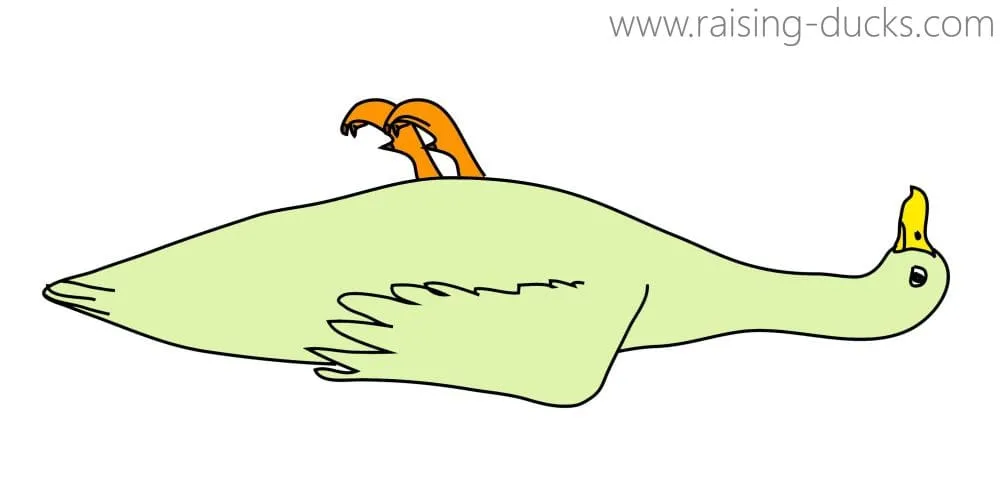
Observe your ducks for at least a few minutes a day. Be sure they’re active, eating and drinking well, and in good health. A duck that sits in the corner with droopy feathers, not eating much, if at all, is probably sick, and probably won’t lay. Parasites will also prevent a duck from laying. Be sure to rule this out when trying to pin down the cause of the absence of eggs.
She’s stressed.
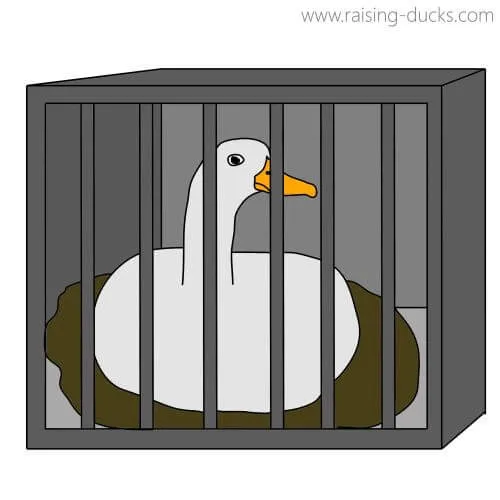
Stress will hamper a duck’s laying ability severely, or even completely prevent her from laying. Is there anything stressful that frequently happens to your duck–being chased, being picked up and petted or held a lot (some ducks enjoy this, but many don’t), being in a pen that is too small, enduring unhygienic living conditions, being bullied by chickens or other animals frequently, not always having water available, or something else? Being mated too often is also stressful, so it’s not recommended to keep ducks in pairs.
Sudden changes in her lifestyle, such as being moved from one home to another, will also cut off her laying temporarily. If you just got your ducks, don’t expect eggs until they’ve had time to settle down and get used to their new surroundings. Adding new ducks to a flock can upset and stress them all, temporarily, due to the pecking order changes.
She’s obese.
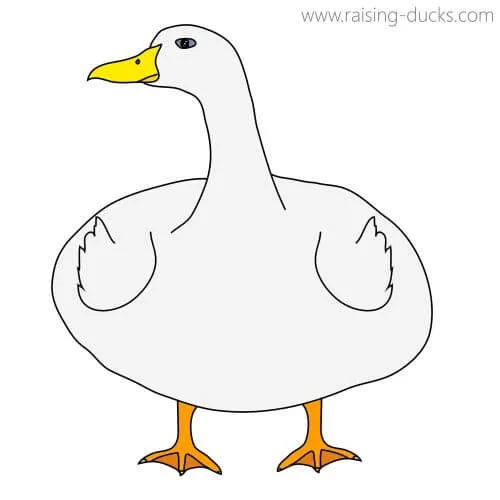
Some ducks are gluttons, and obese ducks don’t lay. Ducks, like humans, are perfectly capable and in fact quite likely to eat way more than they really need to. If she’s locked up all day with no ability to forage, with food available 24/7, she could be overeating. I recommend rationing your ducks’ food, as well as not leaving it laying around all day long, and instead giving your ducks two meals a day.
Also, feeding too many treats that have little nutrition, such as scratch, bread, and lettuce, will fill her up with food that doesn’t give her much nutrition, and thus she’ll use it for fat rather than eggs.
Troubleshooting Tips
When trying to pin down the exact reason your ducks are not laying, these are the main factors to consider:
Your duck’s age
Your duck’s breed
Your duck’s feeding habits
Where your ducks live
What time of year it is
What your ducks’ daily routine and living area is like
Additionally, here’s a sample of my favorite music group, 24K Gold Music, to cheer you up!
I listen to these uplifting, inspiring songs almost every day. You can listen to more here!
Leave a comment
Your email address will not be published.